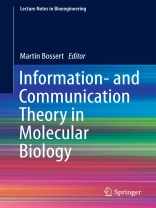This edited monograph presents the collected interdisciplinary research results of the priority program “Information- and Communication Theory in Molecular Biology (In Ko MBio, SPP 1395)”, funded by the German Research Foundation DFG, 2010 until 2016. The topical spectrum is very broad and comprises, but is not limited to, aspects such as micro RNA as part of cell communication, information flow in mammalian signal transduction pathway, cell-cell communication, semiotic structures in biological systems, as well as application of methods from information theory in protein interaction analysis. The target audience primarily comprises research experts in the field of biological signal processing, but the book is also beneficial for graduate students alike.
Tabela de Conteúdo
Introduction.- Micro RNA as an integral part of cell communication: regularized target prediction and network prediction.- Information Flow in a Mammalian Signal Transduction Pathway.- Information Theoretic Concepts to Unravel Cell-Cell Communication.- Finding new overlapping genes and their theory (FOG-Theory).- The Evolutive Adaptation of the Transcriptional Information Transmission in Escherichia coli.- Improving the Reliability of RNA-seq: Approaching Single-Cell Transcriptomics to Explore Individuality in Bacteria.- Morning and evening peaking rhythmic genes are regulated by distinct transcription factors in Neurospora crassa.- Evolution of the AMP-activated protein kinase controlled gene regulatory network.- Semiotic Structures and Meaningful Information in Biological Systems.- Information Transfer in the Mammalian Circadian Clock.- The DNA from a coding perspective.- Application of Methods from Information Theory in Protein-Interaction Analysis.- Identification of Causal Dependences in Gene Regulatory Networks using Algorithmic Information Theory.- An Information Theoretic Approach to Stimulus Processing in the Olfactory System.- RNA Structures as Processing Signals.












